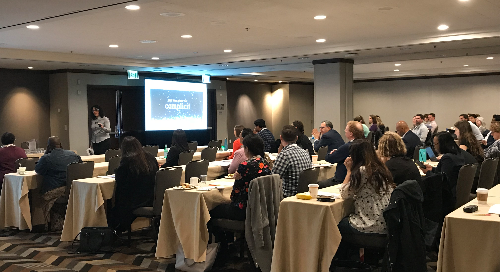I had the distinct honor of opening SCCE’s San Francisco Compliance & Ethics Forum on May 18th with a session entitled #SHIFT Happened. My presentation showcased the trends and enhancements in compliance and ethics program strategies as a result of the #METOO and #TIMESUP movements. As the storm of sexual harassment allegations continue to dominate headlines, it has revealed the extensive exposure companies face when a culture of trust and respect is not fostered, and patterns of abuse of power or complicit norms are tolerated for too long. My remarks centered around the shift that has unfolded catalyzing the conversation around leader accountability in building ethical workplace cultures.
During my presentation, I explored why accountable leadership matters more than ever, from the top and through the middle. We discussed the desire for greater Moral Leadership with insights from LRN’s State of Moral Leadership Report. The prominent role front-line supervisors play in influencing a culture of trust and respect was thematic. Supervisors are observed as the shepherds of activating policy, they are expected to ‘walk the talk’. Since leaders are the most influential guideposts of culture, inaction on zero tolerance, or allowance of patterns of abuse can cause severe damage. I shared research around the correlations between higher performance and deeper engagement in high trust cultures. We explored the inherent tension around the pressures to meet corporate objectives, balancing profits, team motivation, performance, while striving to rebuild trust and promote an ethical workplace culture.
One thing we all agreed upon is that training alone will not shift behavior. The training experience needs to be values-based, immersed in a contextual dialogue supported by leaders. Participants shared strategies their organizations are using to build greater transparency around procedural justice, placing values into action such as promoting speaking out campaigns, building toolkits to coach and develop leaders around fostering a difficult dialogue. We also explored the need to work collaboratively across functional groups such as Learning, Corporate Communications, HR and IT to enable a more cohesive and unified narrative around building ethical cultures. Further I shared insights how the board and executive leadership team need to take more preemptive action and accountability around behavior.
